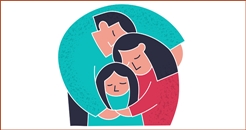 Experiences that build resilience strengthen children who face adversities
Experiences that build resilience strengthen children who face adversities
From an article on Child and Family blog
Adversity, such as abuse, neglect, and poverty, damages children. But protective experiences can build resilience against adversity and promote positive development.
Relationships and resources proven to counter the impact of adverse experiences have been identified below. They mean that a child’s outcomes may turn out to be much better than expected in the face of difficult circumstances.
This list of PACEs – Protective and Compensatory Experiences – is based on more than common sense. The impact of such experiences is often identifiable through changes to the brain and in behaviours. From research evidence, a list of the top 10 types of relationships and resources that provide the PACEs that bolster children against adversity are as follows:
1. Receiving unconditional love
Not only do children need to be nurtured and loved, that love should feel unconditional. This does not mean that children never get in trouble or parents never get mad. The crucial point is that whatever a child does, the parent stays on the child’s side. As an infant, it means that when you cry, you get a response; your parents make eye contact with you and cherish you; and they sing, play, and talk with you.
2. Having a best friend
Close friendship offers protection from peer rejection, bullying, and victimization. This happens not just because a child has someone to talk to, but because it helps the child learn how to deal with conflict and grow a relationship over time. Children have a sense of being important and they have someone to go to.
3. Volunteering in the community
Volunteering helps children learn about the needs of others and gives them the opportunity to see a world outside their own. When they understand that helping is not done out of pity, it allows them to accept help from others when they need it.
4. Being part of a group
Being in a group gives children a sense of belonging outside the family. It allows children and teenagers to learn about themselves in different contexts, and provides opportunities for friendship and leadership.
5. Having a mentor
Having an adult other than a parent who can be trusted and counted on for help and advice helps protect against psychological distress and academic difficulties, and reduces the incidence of high-risk activities.
6. Living in a clean, safe home with enough food
These primary needs are crucial. Good, regular nutrition is important for brain development and protects against health problems; eating dinner regularly with your family reduces the risk of weight problems. Chaotic, unpredictable home environments are associated with harsh and inconsistent parenting.
7. Getting an education
Just like living in a clean, safe home, the opportunity to learn and be educated in an environment with boundaries and rules also protects children from risk. High-quality early childhood programs make a lasting difference to outcomes for children from low-income families.
8. Having a hobby
Whether it is playing an instrument, dancing, doing judo, reading, or playing chess, any recreational activity helps teach self-discipline and self-regulation, and can provide children and youth with a routine and a sense of mastery, competence, and self-esteem.
9. Engaging in physical activity
Being physically active helps children handle the physiological effects of stress on the body, and improves mood and mental health. In so doing, it reduces the likelihood that children will grab a bag of chips or lash out to relieve stress.
10. Having rules and routines
Security comes when children know what to expect and when caregivers enforce clear rules and limits. Children cannot parent themselves; they need high expectations, consistency, and parents’ involvement. In early childhood, this means that parents should establish and enforce bedtime and other routines, redirect children when they misbehave, and as children grow up, explain the effects of their behaviour on others.
PACEs matter for all children
Read full article here.
Retweet about this article:
From an article on Child and Family blog, 23/06/2021